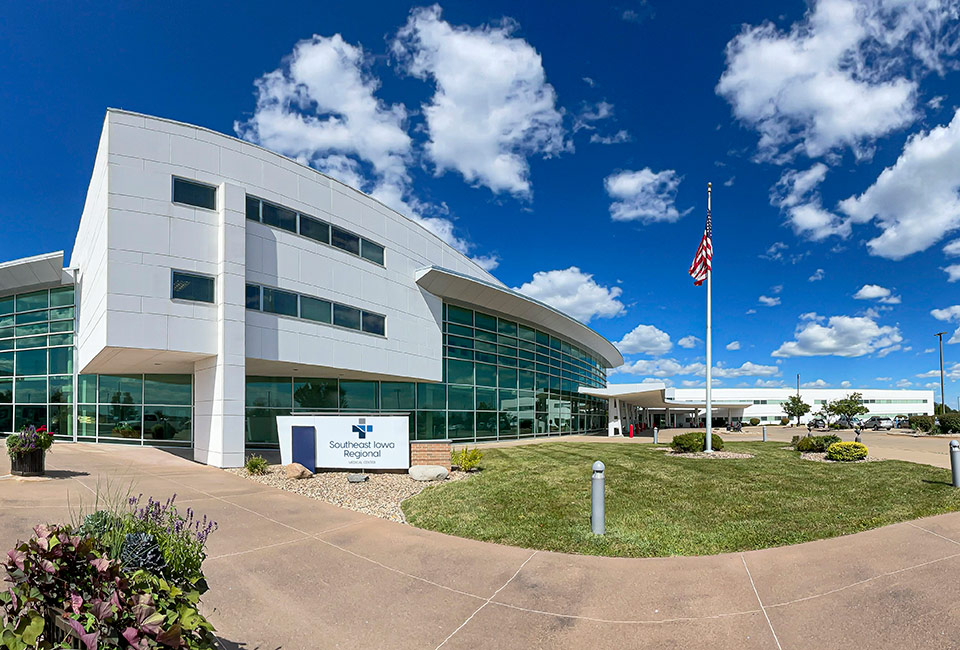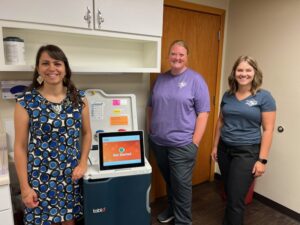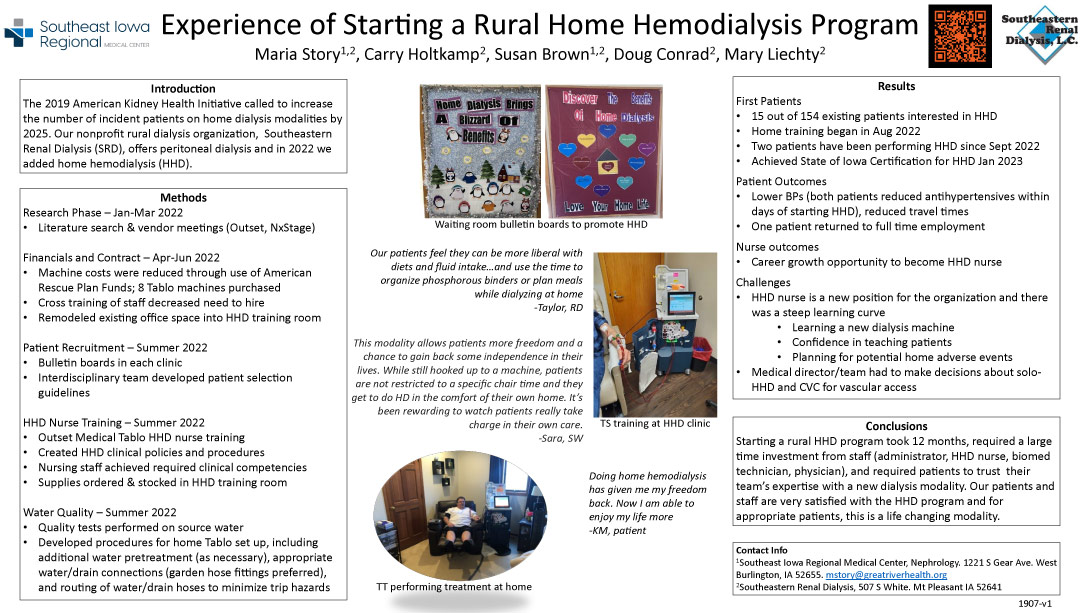How to Successfully Start Up a Rural Home Hemodialysis Program

Summary
Nephrologist Maria Story, MD and team launched the first home hemodialysis program in southeast Iowa, with their patient-centered strategy documented in a study they hope can inspire others.
In remote communities, patients living with chronic kidney disease (CKD) can face unique hurdles impacting their health and quality of life, such as long, weather-impacted commutes to dialysis centers. Giving patients back their autonomy with home hemodialysis (HHD) and serving as an example for other kidney care providers looking to set up their own program are the goals of nephrologist Maria Story, MD, FACP, CHS, and her team in southeastern Iowa.

Dr. Story has always had an interest in helping underserved CKD patients and envisions an empowering and independent dialysis experience for them and their families. She is the HHD program Medical Director at Southeastern Renal Dialysis. In addition, Dr. Story practices as part of a nephrology group at Southeast Iowa Regional Medical Center, and is Clinical Quality Officer and Clinical Hypertension Specialist at the hospital. She also serves as an Adjunct Clinical Associate Professor at the University of Iowa Carver College of Medicine.
Dr. Story and the team at Southeast Iowa Regional Medical Center’s partner dialysis organization, Southeastern Renal Dialysis, have launched and grown a successful rural home hemodialysis program featuring the Tablo® Hemodialysis System. The program serves patients at the five in-center facilities spread throughout the region, with patient training and monthly visits taking place at the Mt. Pleasant facility. (See their July 31, 2023, press release here.) The team started training their first patient to go home in August 2022, and currently have four patients managing their own home hemodialysis on Tablo.
“Before we started our program, there weren’t any patients in our area doing home hemodialysis,” says Dr. Story. “I thought, there was no reason that we couldn’t have a HHD program in rural southeast Iowa. A year into our program, I’m so passionate about Tablo and want to get the word out and share that it is such a great option for our patients and for other rural communities.”
Clinical Evidence of the Team’s Success
Dr. Story and her team felt so strongly about sharing their program experience that they decided to document their findings in a clinical case study. The study, entitled “Experience of Starting a Rural Home Hemodialysis Program,” was announced at the April 2023 National Kidney Foundation Spring Clinical Meetings (NKF SCM), with the abstract (#381) published in the American Journal of Kidney Diseases.
In the study, the team outlines their decision-making process and experiences from January through August 2022, while starting up their new program. As noted in the poster below, this included several steps: researching and selecting a home hemodialysis equipment vendor, financials, staff training, office space remodeling, patient recruitment, policies and procedures, nurse training with the Outset Medical team and supplies. The final step included water quality assessment, and procedures for setting up water and drain connections in patients’ homes.
The team also reported high interest in home hemodialysis as they worked to recruit in-center or peritoneal dialysis (PD) patients, which they noted was surprising as the patient population in the region averages between 65 and 80 years of age. Costs for their first eight Tablo consoles were covered through the American Rescue Plan, with additional machines added later.
The study abstract noted encouraging results, with implications for other programs. It noted that “offering HHD in rural communities reduces travel time for patients, and will minimize missed treatments in
inclement weather, and improve patient outcomes. Both patients on HHD noticed a rapid reduction in blood
pressure, one was able to resume work full-time.” One other positive conclusion: “Our patients and staff are very satisfied with the HHD program and for appropriate patients, this is a life-changing modality.”
Carry Holtkamp, RN, BSN, is Southeastern Renal Dialysis’ Dialysis Clinical Administrator and Home Hemodialysis Nurse Manager, and also a co-author on the study. “I have a passion for helping people to continue doing the things they love in their life, whether that is continuing to work or have more time with their family,” she says.
Holtkamp adds that her own training on Tablo was also quick and easy, and she’s been able to train other staff to become comfortable in training patients to use the system at home. “We are training a home hemodialysis technician now, and she’s taken to it pretty easily,” she says.
“It’s been really good for our nursing staff to grow their career, and learn new skills and a new machine,” says Dr. Story.
Dr. Story first heard about Tablo in 2021, when she was a fellow at the University of Iowa. “During the last six months of my fellowship training, the Iowa City VA Medical Center had recently purchased several Tablo machines for use in their outpatient dialysis unit,” she says. “Their dialysis nurses showed me the machine and how to set it up, and I thought it was terrific. We did some market research on HHD systems available to decide which one would work best for us, and based on our impressions of Tablo, Carry and I started talking to our administrator about it.”
“We’re now very excited to be able to offer a home program, and a machine that is intuitive and easy for patients. If our patients weren’t willing to use it then we wouldn’t have a home program, it’s that simple,” Dr. Story continues.
A Solution Focused on Retention
Tablo was selected by the southeastern Iowa team based on its ease of use — they wanted a machine they felt patients would be willing to use long-term.
“We knew that if we wanted to retain patients and have long-term success with our home hemodialysis program, we had to have a machine that reduces the fairly high burden for patients and families that they would be willing to stick with,” she says. This includes the ability of Tablo to purify water and generate dialysate on-demand, without batching or bags, reducing the supplies that patients need to store. “We don’t want people to burn out and return in-center, so we need the machine they use to be as simple as possible. Tablo is very intuitive. We also wanted to help improve quality of life for our rural kidney disease population and reduce their long drive times to the dialysis center.”
She also says she’s very impressed with the patients from her program who have been home on Tablo the longest, for nearly a year. “I have asked them several times during our monthly visits, is this going okay for you, are you liking it? They’ve always been very positive and say it works well for their schedule. They know they have the choice to go back in-center any time, and they’ve never given me any indication that they would want to stop using Tablo at home.”
Holtkamp says the Tablo touchscreen interface allows for a friendly and non-intimidating interaction between the machine and the patient. “It’s so streamlined, it guides them through each step,” she says. “It won’t let them move on until they’ve completed what they need to do. There are a lot of safety mechanisms built in. Tablo training went smoothly for both our patients and their caregivers, and they all really like it,” she explains.
Trading Long Commutes for Independence at Home
The team’s patients who are currently at home with Tablo all started dialysis in-center. Two had previously been on PD, but health issues led to discontinuation of the treatment modality. “We haven’t had anyone who had done home hemodialysis previously,” says Holtkamp.
Dr. Story says one of the previous PD patients was very committed to staying at home, which made a huge impact on his willingness to try Tablo. “Prior to our HHD program, that patient would have ended up in-center, because he wouldn’t have made the commitment to drive a far distance to another home hemo program.”
The second patient who was previously on PD had switched to in-center hemodialysis, but was driving more than 70 miles three times a week to get to the closest facility. “Doing hemodialysis at home with Tablo has been really life changing for him,” says Dr. Story. “It’s given him a lot of freedom in terms of time, and financially since he and his wife aren’t having to do all that driving.” (Read this patient’s story here.)
Dr. Story and Holtkamp both say that the most surprising comment they’ve heard from all their home patients, although the patients haven’t met each other, is they are feeling and sleeping well since they’ve been on Tablo at home.
Future Growth Plans and Impact
Dr. Story has plans to grow their rural home hemodialysis program by introducing Tablo to patients treating in-center, and has several machines ready to go home. “We plan to promote awareness by taking a machine to each dialysis unit to demo as a lobby day,” she says. “We’ve also talked about in the future having Tablo in the hospital, that way patients can become familiar with the machine from the get-go when they first start dialysis.”
The team is hoping that by sharing their success story, they can help spread the word about the benefits of offering a Tablo home hemodialysis program, both throughout their rural community and nationwide. “We’re excited to be part of something like this because we’re a small, rural place and a lot of times places like us get overlooked,” says Dr. Story. “I would say to others, it’s easier to start a home hemo program than you might think. And if you do, the patients will come.”
About Great River Health
Great River Health is the only comprehensive healthcare provider in southeast Iowa. Although it serves a rural area that includes parts of Iowa, Illinois and Missouri, Great River Health offers many of the same services found in larger hospitals. You don’t have to travel for quality medical care. High-tech technology and high-quality health care providers are close to home.
Great River Health includes Southeast Iowa Regional Medical Center campuses in West Burlington and Fort Madison, Henry County Health Center in Mount Pleasant, more than 30 primary and specialty care clinics, five retail pharmacies and a medical equipment and supplies store.
About Southeastern Renal Dialysis, L.C.
At Southeastern Renal Dialysis it is our mission to provide renal dialysis services in a manner that achieves clinical excellence and patient satisfaction. We are committed to providing a safe and effective environment that benefits the communities that we serve. Southeastern Renal Dialysis is your source for caring and compassionate renal dialysis services in the tri-state region, with locations in Fairfield, Mt. Pleasant, West Burlington, Ft. Madison and Keokuk in Southeast Iowa.
Indication statement:
The Tablo® Hemodialysis System is indicated for use in patients with acute and/or chronic renal failure, with or without ultrafiltration, in an acute or chronic care facility. Treatments must be administered under physician’s prescription and observed by a trained individual who is considered competent in the use of the device. The Tablo Hemodialysis System is also indicated for use in the home. Treatment types available include Intermittent Hemodialysis (IHD), Sustained Low Efficiency Dialysis (SLED/ SLEDD), Prolonged Intermittent Renal Replacement Therapy (PIRRT), and Isolated Ultrafiltration.
Caution statement:
This device is not indicated for continuous renal replacement therapy (CRRT) and is cleared for use for up to 24 hours. The dialysate generated by this device is not sterile and should not be used for intravenous (IV) infusion.


